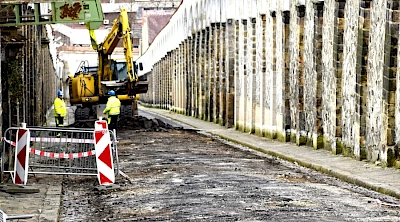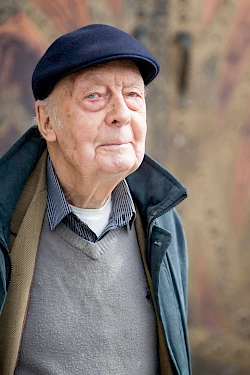Weekly review no. 19
09.02.2024
Děčín is renovating the Long Ride

The time had come on Monday. Construction vehicles arrived and excavators tore up the asphalt surface of the almost 300 meter long drive to the castle in Děčín. Classic access to the castle will be closed almost all year round. The reason is the renovation of the access road that was built almost 350 years ago. Not only the condition of the road, but also the high walls surrounding it were already in poor condition. In the meantime, part of the wall had to be stabilized. By December, the asphalt will be replaced with concrete, the color of which will be reminiscent of historic gravel paths, and the wall will be completely renovated.
Since the entire access route, including side entrances, is closed, visitors sometimes have to take detours. It becomes almost impossible for people with restricted mobility to visit the castle. As an alternative access, the castle recommends using the southern gardens. But there are stairs there too. There is also a small parking lot near the warehouse. Alternatively, the path on the north side of the Elbe bank and the Tyrš Bridge can be used. The path winds up the northern slope and is relatively steep. Both alternative paths lead into the first castle courtyard.
The Langefahrt is one of the most sophisticated castle entrances. On the north side, in the upper part, is the rose garden, which has been closed since last August and whose renovation will take until 2025.
Ski resorts defy the thaw
The high temperatures and rainy weather make winter sports in the mountains almost impossible shortly before the start of the winter holidays in Saxony. The snow has also all but melted away in the Bohemian Ore Mountains. This means there is no snow for cross-country skiing. Some ski areas have also stopped operating for the time being. These include the ski areas at Bouřňák (Sturmer) near Mikulov and in Český Jiřetín. On the other hand, the ski areas in Telnice and Klíny still have enough artificial snow, but the conditions are not getting any better. The precipitation in the middle of the week caused a short-term improvement, as it fell as snow at altitudes over 500 meters, but disappeared again the next day.
Skiing is completely problem-free on the highest mountain in the Ore Mountains, the Klínovec (Keilberg). But even at this altitude the temperatures are currently above zero. The ski areas at Plešivec and Ještěd are also open. The relatively warm weather has been around for over three weeks. Low temperatures are not in sight until the end of next week. Until then, other ski areas could close temporarily.
Czech Republic continues without euro
President Petr Pavel made the introduction of the euro a topic in his New Year's speech. When it joined the EU in 2004, the Czech Republic actually committed itself to introducing the common currency. However, the Union is still waiting for this today.
But politicians had to react to the president's offer, especially since the mayor's party STAN, a government partner, has been trying for a long time to open the way to the introduction of the euro. The Pirates and TOP09 have also long been supporters. Prime Minister Petr Fiala's ODS is strictly against this.
At the beginning of the week, European Minister Martin Dvořák (STAN) created facts and appointed a coordinator for the introduction of the euro. It is the renowned economist Petr Zahradník. In doing so, Dvořák duped his coalition partners. On Wednesday it was agreed not to have a coordinator for the time being. However, Zahradník remains in office as Dvořák's advisor. However, he is not allowed to carry out cross-departmental coordination.
This means that the fate of the euro in the Czech Republic is likely to be sealed again. The parties know only too well that such a step would not have a majority among the Czech population. On the contrary, a large majority is in favor of retaining the crown.
Former ambassador to Germany František Černý is dead

He was there wherever Germany and the Czech Republic came together. Former ambassador František Černý died at the beginning of February at the age of 93.
Born in Prague in 1931 into a German-Czech family, Černý carried the communication gene. After the Second World War, he first learned to be a machine lathe operator. In the 1950s and 1960s he experienced the growing thaw and the Prague Spring as a broadcast journalist. After the crackdown, he was no longer allowed to work as a journalist and made ends meet as a German teacher.
But after the Velvet Revolution his hour came. President Václav Havel knew only too well why he sent Černý as ambassador to Germany. First to Bonn, from where he moved the embassy to Berlin. But even the well-deserved retirement didn't end there. On the contrary, František Černý was very active in the sometimes painful process of growing together between the two states and in working through the sore points. Together with the last author of German-language literature by Kafka and Brod, Lenka Reinerová, and the Germanist Kurt Krolop, he founded the Prague German Language Literature House, where he was active until the end.
With Černý, not only the Czech Republic but also Germany is losing a mediator who was always interested and prepared to approach people with the nobility of the old school. He was actually an ambassador until the end and not just in retirement
The creation of this newsletter is co-financed by tax revenue based on the budget approved by the Saxon state parliament.
